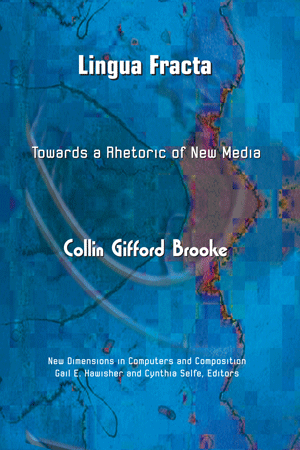Brooke, Collin Gifford. Lingua Fracta: Towards a Rhetoric of New Media.
Cresskill, NJ: Hampton P, 2009. 222 pp, ISBN 9781572738935
Reviewed by Kerri Hauman, Bowling Green State University

CONCLUSIONS |
|
I appreciate Brooke’s careful explanation, reiterated throughout the book, of his project’s purpose, limitations, and inherent complications/contradictions. For instance, he readily acknowledges that splitting the canons into distinct chapters contradicts his claim that they cannot be neatly separated, yet he feels their limited autonomy as an ecology of practice justifies his decision to do so. Brooke also includes many careful qualifications and great attention to differences in how he applies and/or defines terms others have used, such as ecology. I believe this careful treatment and acknowledgement of inherent conflicts serves as support for his overarching claim that he is neither trying to devalue nor completely replace classical notions of rhetoric but rather open space and broaden their scope. Brooke unapologetically admits that his work is intended to raise concerns, not to answer questions with finality. While this admission may strike some as too easy, it strikes me as wise: the project of bringing rhetoric and new media together is still a nascent one, so it is better now to outline issues, define problem spaces, and lay out challenges than it is to pretend one has any definitive answers. Because of this approach, someone looking for clear pedagogical implications may be disappointed to find that is not what Brooke concerns himself with in Lingua Fracta. However, even though his arguments are not explicitly geared at instruction, implicit connections exist – particularly, of course, for those reading for them. These connections are especially present in his numerous examples of new media that already serve as tools for understanding and using the canons in new ways. I can imagine, for example, how his treatment of various social bookmarking sites or tagclouds might inspire innovative pedagogy and class activities. Alternatively, this book would make perfect sense in the rhetoric classroom or any class involved in examining new media, and a quick Google search proves that some are already using it this way. Ultimately, Brooke’s treatment of technology as a necessary, integral part of the field rather than a smaller subsection or specialty is valuable to all of us in rhetoric and composition.
|